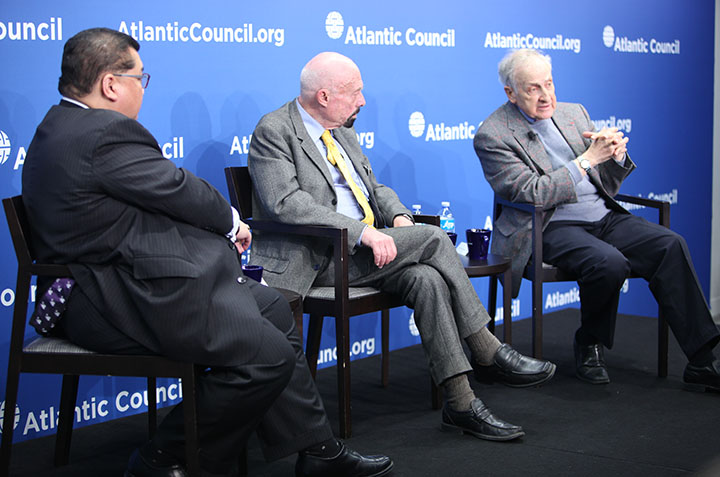 The Obama administration must pay closer attention to developments in sub-Saharan Africa, particularly in the Democratic Republic of the Congo where President Joseph Kabila is poised to extend his term in violation of constitutional limits, according to Herman J. Cohen, a former US Assistant Secretary of State for African Affairs.
The Obama administration must pay closer attention to developments in sub-Saharan Africa, particularly in the Democratic Republic of the Congo where President Joseph Kabila is poised to extend his term in violation of constitutional limits, according to Herman J. Cohen, a former US Assistant Secretary of State for African Affairs.
“I fear that the United States, being tied up so much with the Middle East, is really not geared up to do something about the Congo,” said Cohen.
“The bottom line is that US diplomacy right now should place high priority on talking… with other central African countries about the Congo,” he added.
Cohen spoke on a panel hosted by the Atlantic Council’s Africa Center on March 15. Gérard Prunier, Senior Fellow with the Africa Center, joined Cohen in a discussion, which was moderated by Africa Center Director J. Peter Pham.
In the Democratic Republic of the Congo (DRC), Kabila is expected to extend his stay in power despite constitutional limits on seeking a third term in office. The DRC is under pressure to hold presidential elections for which a date has yet to be announced.
Amid protests and strikes in the DRC’s capital Kinshasa, Pham observed that the region and international community is “seeing this iceberg ahead of us: the December 19 deadline for transition in elected leaders” in the DRC.
The DRC is the largest country in sub-Saharan Africa. Since the end of military dictator Mobutu Sese Seko’s thirty-two-year rule following his ouster in 1997, the DRC has only become more familiar with regional and civil conflict, refugee crises, and perennial corruption. From 1997 to 2003, the DRC was embattled in a civil war that claimed anywhere between four to six million lives. Today, the country’s myriad conflicts are focused in the eastern Great Lakes region where political strife in Uganda, Rwanda, and Burundi constantly spill over across the loosely-controlled DRC border. Following the M23 flare-up on the DRC-Rwanda border in 2013, Kinshasa-sponsored militias and Rwanda-backed rebel groups have maintained a tense peace.
It is these persistent climates of fragility that make the DRC an extremely important state in relation to the continent at-large and the future of Western diplomacy with central Africa.
“It is not only a question of the size of the country. The Congo touches all sub-contexts of the continent,” said Prunier. “It is absolutely central to the reality of the African continent. Unfortunately, this reality has been a series of tragedies.”
Prunier is the author of a recently released Atlantic Council report entitled “Why the Congo Matters.” The report concludes that the international community needs to prioritize engagement with the DRC in order to promote stability and economic growth, and prevent the country from slipping back into an all-out regional war.
The political situation in the Great Lakes is one where democracy and security are possibly mutually exclusive. Prunier contended that Kabila is signaling to the international community that if elections are held, security in the DRC would be jeopardized.
“However,” Prunier noted, “there are still possibilities that the election will be less eventful and less violent than we fear…Congo is not in such a binary situation like Rwanda is with President [Paul] Kagame” modifying the constitution to extend the presidential term to 2034.
An overly-cautious climate governs the current diplomatic networks between the United States, Europe, and the central Africa region. Cohen noted that while it is possible that economic sanctions against Kabila could push the DRC to host free and fair elections, it is just as likely that enacting sanctions would incite conflict.
“There is this feeling in the [Obama] administration that we do not want to be accountable for violence,” said Cohen.
Cohen reiterated the need for the United States and Europe to keep the DRC in its diplomatic sights, even though the Islamic State of Iraq and al-Sham (ISIS), the European migrant crisis, and the Syrian civil war dominate foreign policy headlines.
“Most of Africa right now, except where you have pockets of ISIL and Boko Haram… does not sit very high on the intervention priority list in terms of using resources, in particular military resources,” said Cohen. ISIS is also known as ISIL and Daesh.
“Economic and political intervention is going to happen in the Congo, but not right away,” he added.
Mitch Hulse is an intern at the Atlantic Council.
Image: From left: J. Peter Pham, Director of the Atlantic Council’s Africa Center, moderated a discussion on developments in the Democratic Republic of the Congo with Gérard Prunier, a Senior Fellow with the Africa Center, and Herman J. Cohen, a former US Assistant Secretary of State for African Affairs, at the Atlantic Council on March 15. (Atlantic Council/Victoria Langton)
